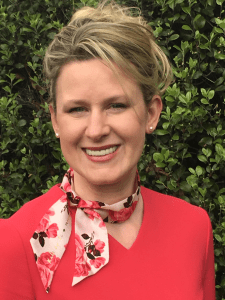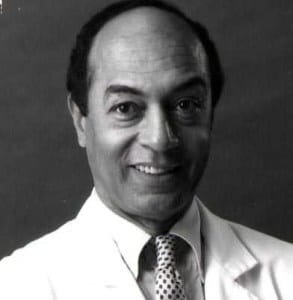
Wellness session at Annual Meeting to teach best practices at systems-based level
The case for a healthy night’s sleep | Shannon MacLaughlan David, MD, MS
SGO Winter Meeting breaks attendance record third year in a row
John D. O’Boyle named ACOG representative to SGO Board
MSK professor emeritus Walter Burnett Jones, MD, passes away at age 86
Wellness session at Annual Meeting to teach best practices at systems-based level
Building upon discussions at previous SGO Annual Meetings about issues that contribute to physician burnout, the 2019 SGO Annual Meeting on Women’s Cancer will include a wellness session on Saturday, March 16, “Physician Wellness Advocacy: Taking Control and Changing the System,” with moderators Leslie Bradford, MD, from Maine Medical Center in Scarborough, ME, and David M. Kushner, MD, from the University of Wisconsin-Madison in Madison, WI. “Attendees will learn how institutions can make positive change towards provider wellness and how to best advocate for institutional change,” said Dr. Kushner.
At the 2017 SGO Annual Meeting in National Harbor, MD, Tait D. Shanafelt, MD, American Board of Obstetrics and Gynecology (ABOG) Guest Lecturer presented data indicating that substantial contributors of burnout include the EHR and system-based issues, rather than simply personal resilience. In this year’s wellness session, attendees will be encouraged to actively seek opportunities to prevent, recognize, and manage the stressors associated with a career in gynecologic oncology, including learning how to approach changing the system.
Course faculty and presentation topics include:
- David M. Kushner, MD: Institutional Wellness Efforts: Local and National
- Kenneth H. Kim, MD, FACOG, FACS, University of Alabama at Birmingham, Birmingham, AL: Future Direction of Wellness at Society of Gynecologic Oncology
- Gretchen E. Glaser, MD, Mayo Clinic, Rochester, MN: EMR Optimization
- Nathalie D. McKenzie, MD, MSPH, Florida Hospital Cancer Center, Orlando, FL: Financial and Nutritional Wellness.
Two scientific abstracts will be a part of the session. Sarah K. Lynam, MD, Roswell Park Cancer Institute, Buffalo, NY will present the abstract, “Breaking the silence: Burnout among gynecologic oncology trainees is an impending crisis,” and Taylor B. Turner, MD, St. Luke’s Mountain States Tumor Institute, Boise, ID will present, “The Society of Gynecology Oncology wellness curriculum pilot: A groundbreaking initiative for fellowship training.”
The case for a healthy night’s sleep | Shannon MacLaughlan David, MD, MS

Shannon MacLaughlan David, MD, MS
There is nothing more glorious than sleeping in on a weekend. I have always found lazy mornings to be luxurious, and it still baffles my family how I left that out of the equation when forging my career path toward gynecologic oncology. Despite my passion for a good night’s sleep, I function pretty well without it. Or so I thought. Turns out that getting less than seven hours of sleep a night on a regular basis is associated with a ton of health issues, including, but not limited to, obesity, diabetes, metabolic syndrome, heart attack, stroke, depression and—wait for it–death. No wonder the American Academy of Sleep Medicine recommends adults get seven to nine hours of sleep a night. So is every gyn onc doomed to a premature death?
I find myself rationalizing. . . Most of the evidence linking sleep deprivation and mortality in humans is correlative and often confounded by sleep disorders like obstructive apnea. But, at least one prospective study demonstrated in healthy volunteers that sleep debt (four hours a night) for six nights increases night time cortisol, impairs glucose tolerance, and stimulates the sympathetic nervous system. Whether I like it or not, there is a compelling case to be made for getting a healthy night’s sleep.
In case you’re not worried about your own health and longevity, you can’t get around the fact that sleep deprivation is linked to compromised performance, productivity and, in our line of work, safety. Just as the Accreditation Council for Graduate Medical Education (ACGME) has rules about recognizing and mitigating fatigue in trainees, we should probably think about ways a gyn onc can sneak in some restorative sleep from time to time. I don’t have the answers, but I offer here some thoughts and discussion points.
Some people swear by the daytime power nap. Research suggests napping may benefit performance and memory outcomes for some people, but certainly does not replace night time sleep, which has a different physiologic purpose.
So what can you do to maximize the quantity and quality of night time sleep? For starters, put down your phone. And I don’t just mean turn off the ringer. Screen time is stimulating and addictive, and the blue-green light emitted from device screens suppresses the melatonin surge your body needs to fall asleep. This is why sleep experts recommend putting away the tech an hour before bedtime.
If you just can’t do it, at least turn on the Night Shift function in iOS (or Night Mode for Android). These apps minimize the blue light emissions from your smart phone based on the time of day. I also downloaded f.lux onto my laptop for this same purpose. There are also glasses that filter the blue-green light. But none of these things will protect you from whatever it is in the email you insisted on reading before bed, or in the middle of the night, when “you’re up anyway” because someone paged you.
Once you’ve put down your phone, find what helps you relax and declutter your mind. Meditation and deep breathing exercises that reduce your heart rate variability and literally calm your nerves have become very popular for this, and there are a million apps available (but then you risk picking up a device). If meditation isn’t your thing, try this mental exercise that is used by military and pilots to fall asleep in two minutes:
- Relax the muscles in your face, including tongue, jaw and the muscles around the eyes
- Drop your shoulders as far down as they’ll go (i.e., open the space between your head and shoulder) and relax your arms, “scanning” your upper and lower arm, one side at a time. Allow them to feel heavy and weighted into bed (or whatever surface you’re on!)
- Breathe out, relaxing your chest, emptying all the breath
- Relax your legs, starting from the thighs and working down
- Declutter your mind – Focus on one of these images (this can be tailored for what works for you!):
- You’re lying in a canoe on a calm lake with nothing but a clear blue sky above you
- You’re lying in a black velvet hammock in a pitch-black room
-or- - You say “don’t think, don’t think, don’t think” to yourself over and over for about 10 seconds
I am hopeful that the lifestyle of a gyn onc is not going to cause my early demise, but I do believe it’s important to sleep when I can. Remember those sleep-deprived volunteers? Their metabolic anomalies reversed when they were allowed 12 hours of time in bed for a week, during which they slept an average of nine hours. So maybe sleeping in on a weekend isn’t just a luxury, it’s a necessity!
Shannon MacLaughlan David, MD, MS, is a Visiting Associate Professor of Gynecologic Oncology at the University of Illinois at Chicago.
SGO Winter Meeting breaks attendance record third year in a row
The SGO Winter Meeting, held Jan 17-19at the Resort at Squaw Creek, Olympic Valley by Lake Tahoe, CA, broke an attendance record for the third year in a row with 326 attendees—69 more attendees than the previous year. A total of 55 abstracts were presented, with 5 oral abstracts and 50 posters. Next year will mark the 25th anniversary of the SGO Winter Meeting and the event will be held at The Westin Snowmass Resort near Aspen, CO, Feb. 6-8, 2020. Photos from this year’s Winter Meeting are available on SGO’s Flickr site. SGO would like to thank the following 2019 Winter Meeting sponsors: Clovis, TESARO, Genentech and AstraZeneca.
John D. O’Boyle named ACOG representative to SGO Board

John D. O’Boyle, MD
Earlier this month, John D. O’Boyle, MD, from the Providence Regional Cancer System (PRCS) in Olympia, WA, was appointed ACOG Representative to the SGO Board of Directors effective immediately through October 2020. Dr. O’Boyle is a board-certified gynecologic oncologist who joined PRCS in September 2018. Prior to moving to Washington, he was assigned as faculty member for the residency and fellowship programs at Walter Reed Medical Center in Bethesda, MD. Dr. O’Boyle attended the US Naval Academy and earned his medical degree from the Uniformed Services University in Bethesda, MD.
He completed a residency in OB-GYN at the San Diego Naval Medical Center, and a fellowship in Gynecologic Oncology at University of Texas Southwestern Medical Center in Dallas. In addition to clinical assignments at Naval Medical Center Portsmouth, VA; Madigan Army Medical Center in Tacoma, WA; and Walter Reed National Military Medical Center, he has held positions as a regional Medical Director with TRICARE and as CMO for the military’s National Capital Region. Dr. O’Boyle currently serves as the ACOG Armed Forces District Chair. John is married to Amy O’Boyle, a urogynecologist, and they have three sons.
MSK professor emeritus Walter Burnett Jones, MD, passes away at age 86

Walter Burnett Jones, MD
It is with great sadness that SGO announces the passing of Walter Burnett Jones, MD, on Jan. 18, 2019, at the age of 86. An SGO member for over 30 years, Dr. Jones was among the first individuals to complete the Fellowship in Gynecologic Oncology at Memorial Sloan Kettering in New York City in 1970, as well as being among the first to receive American Board of Obstetrics and Gynecology (ABOG) certification in Gynecologic Oncology in 1974.
“Dr. Jones was a gifted surgeon whose research contributed to our understanding of the management of gestational trophoblastic disease and early invasive cervical cancer,” said SGO President Carol L. Brown, MD. “Dr. Jones was an outstanding teacher and mentor for hundreds of residents and fellows at Memorial Hospital until his retirement with the honor of Professor Emeritus in 1997.”
In an announcement to the Memorial Sloan Kettering Gyn Service, Nadeem Abu-Rustum, MD, stated:
Dr. Walter B. Jones was a compassionate, outstanding surgeon and clinician. He began his career at Memorial Sloan Kettering Cancer Center as a Resident in 1968. He subsequently served as a Fellow and then Attending Surgeon until he retired in 1997. In 1993, he was elected as a Senior Member of the Commission on Cancer of the American College of Surgeons. As one of the most influential gynecologic oncologists, he showed that a conservative hysterectomy for early invasive cervical cancer was sufficient for cure, sparing women from the negative effects of extensive and unnecessary treatments. Dr. Jones dedicated his career to the care of women with cancer and contributed tremendously to the understanding and initial management of gestational trophoblastic disease. His contributions to the field are unquestionable. He will be missed by all.
A memorial service will be held on Friday, Jan. 25, 11:00 a.m. – 1:00 p.m., at Frank E. Campbell’s Funeral Home, 1076 Madison Ave., New York, NY.